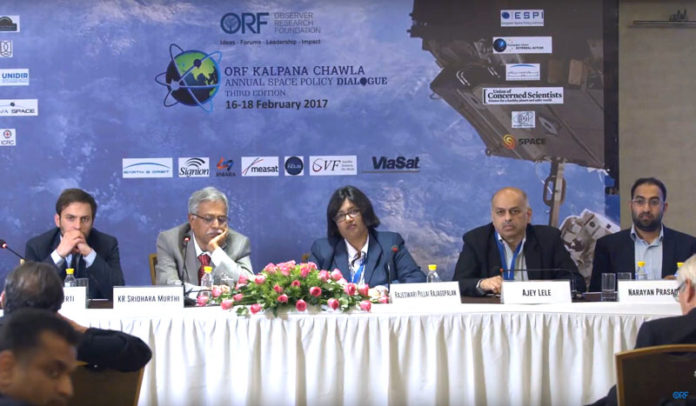
In a recent panel discussion held by the Observer Research Foundation, experts from various sectors got together to discuss India’s need for a national space policy.
With representatives from government, law, academia, the civilian space program, and the private sector, the conversation brought forth very diverse points of view why India needs a space policy, and what such a policy should address.
Covering such topics as India’s strategic interests, private-sector involvement, and the role space has to play in India’s development, the panelists all agreed that India needs a coherent policy.
Background: Does India Have a Space Policy?
India does not currently have a national space policy. However, India does have sector-specific policies, such as a Satellite Communications (Satcom) policy and a Remote Sensing Data policy. India has also signed various international agreements, such as the Outer Space Treaty and the Rescue Agreement.

Cited Gp. Capt. Ajey Lele (retd.), Senior Fellow, Institute for Defence Studies and Analyses, “There are 2 major policies. One, which came in 1997, was a satcom policy, and then there is a policy which came in 2011 about usage of remote sensing data. So these are 2 exhaustive policy documents which are already there. As far as India is concerned, India has been following most of the global norms. The famous 5 treaties – the Outer Space Treaty, the Liability Convention, Rescue Agreement and all that, India is a signatory to all those things. Then when we are talking of group of experts, Group of Governmental Experts (GE Group), which was there on space, India was not part of it. But the transparency and confidence-building mechanisms which have been part of this group – India is accepting all those sorts of things also, which have been projected at the level of the UN”.
It was highlighted that international law does not automatically become Indian domestic law.
Said Ashok G. V., Advocate on Commercial Disputes Resolution., “Fundamentally, we need to

ask ourselves how is it that we can manage the space program in a manner that is compliant with international obligations. Now in this regard it is important to note that international law does not automatically become Indian law. It has to go through a process of legislation in India before it becomes enforceable as domestic regulations”.
The Need for a Policy: A Holistic Remedy for a Fragmented Industry
Although India’s space policy – or a lack thereof – has served the nation reasonably up till now, all panelists agreed that the growth of India’s space program, along with the entrance of new actors, necessitates a new space policy.
K. R. Sridhara Murthi, Director, International Institute for Aerospace Engineering & Management (IIAEM), Jain University, argued that India has made many achievements despite not having a coherent policy.

He said, “What has been the outcome of this policy or fragmented state of policies relating to space in India? There have been some outstanding successes in achieving autonomous space access including a return and capsule recovery experiments, scientific experiments – very unique types of missions to Mars, moon as so on”.
A few panelists, including Marco Aliberti, Resident Fellow, European Space Policy Institute, commented that the Indian space industry is currently too fragmented.
“In India, we have piecemeal policies, such as a remote sensing policy or a satcom policy, but they should be coordinated. There should be a political vision behind these – how to coordinate, how to create synergies? There should be boundaries that a space policy should highlight, for example, what is military space and what is civiliam space. Right now, it’s very blurred.”
Rajeswari Pillai Rajagopalan, Senior Fellow and Head, Nuclear and Space Policy Initiative, Observer Research Foundation, who moderated the discussion, added:
“India’s space policy, a holistic perspective, should come out of a political institution such as the Prime Minister’s Office rather than ISRO, which is a civil space body.
Because a civil space organization that is going to issue a policy will contain those elements that relate to India’s civil space aspect”.

Aligning Space with National Security and Strategic Interests
All panelists agreed that India’s national security should be the top concern of India’s space policy, given the volatile global political situation as well as the South Asian region in particular.
Said Lele, “One must understand and appreciate that, particularly in the region of Southern Asia, we have to take into account things like the wars India has fought with 2 of its neighbours. India, China and Pakistan are all nuclear weapons sates, and all have got missile capabilities. One country, China has already done as A-Sat test.”
Lele continued, “You need to have a military space commission, and then you need to have a space command. The reason for having a space command is that India has made investments into fifth generation fighter aircraft and various other modern infrastructure for war fighting.”
Elaborating on military technology, he said “You’ve got to look at various strategic technologies also, which are getting into the realm in space. Almost every technology now is 100% known as a dual-use technology. You need to invest in strategic technologies from that perspective and there needs to be a certain amount of policy guidelines into these things. And more importantly, you need to have a counter-space capability mechanism also. You are in the era when there are threats about weaponization of outer space. You are going to have assets in space. Whether you need to have cyber capabilities, whether you need to have capabilities for the purposes of jamming, that’s a question of details. But I think from a strategic perspective, one has to take care of these 5-6 things and one needs a policy.”
Encouraging and Regulating Private Sector Involvement and Growth
Another trend that the panelists pointed out is the liberalization of India’s space economy. Currently, India is trying to increase private sector involvement in the space industries, whereas space has previously been driven almost entirely by the public sector.
Said Ashok G. V., “We are seeing, increasingly, in the international arena, companies like SpaceX taking the claim to operate in space. In India, we have Team Indus. So the move of the private sector to space is not just a dream anymore, it’s an emerging reality.”
Despite this trend towards commercialization of space, Ashok argued, there are legal and policy hurdles that must be overcome before private sector players are motivated to invest in the industry.
The first, he said, is the clarity and transparency when it comes to taxation and license application procedures.
“We have issues in taxation, in getting clearances for land acquisition, a whole bunch of problems that need to be simultaneously addressed. But that being said, I think every time we have a query, “What is the cost of an application for seeking a clearance to launch a satellite?” we don’t have a ready answer. Every time we’re asked how long it takes, we don’t have a ready answer”.
The second has to do with the sharing of knowledge and data, and how policy and legislation can be an enabler.
“To give you a simple example, we know now that using remote sensing data, we can really add value to the farmer community in the country, through precision agriculture solutions. But today’s reality is that the remote sensing data policy says that whatever remote sensing data is generated will rest with one single committee and access to that data is through this committee. And it is a restrictive approach to sharing of remote sensing data, which is justifiable also, because there are national security concerns. But there is a way to resolve this deadlock by classifying data into categories of high resolution photos, low resolution photos, and whatever has a national security implication can of course be restricted, but what does not can be shared to ensure that the farmer community and the grassroots is benefited by India’s space program”.
Besides encouraging private sector involvement, a national space policy must address the needs of competing interests while ensuring that the private sector adheres to intergovernmental agreements.
Ashok G.V. continued, “Fundamentally, we need to ask ourselves how is it that we can manage the space program in a manner that is compliant with international obligations. Now in this regard it is important to note that international law does not automatically become Indian law. It has to go through a process of legislation in India before it becomes enforceable as domestic regulations”.
“So key questions have to be asked. If a private sector enterprise ends up committing negligence and puts debris in space, how are we going to enforce those liability obligations in case of damages, if we don’t have a specific domestic law aiding us. So I think that really brings about a need for India to have a specific space law on the subject”.
Supporting Startups in the Space Industry
Narayan Prasad, Co-Founder, Dhruva Space said that, as a startup, more support is needed for entrepreneurs in the India space industry.
“There’s no real startup support ecosystem that comes within India. The thing is that the Indian market is so big that if ISRO works with the startup industry, the expansion of the space economy can be a piece of cake. Because ISRO itself is sometimes playing the role of a user, operator, service provider. It can fill in that gap where, if there’s a startup that picks up on an idea, and ISRO has picked up on it, be it via Antrix or ISRO itself, providing some sort of consultancy and things like that, and at the same time, the federal nature of the government of India and the State governments, they allow enough room for any company that is out there to do any sort of a service.”
Added Ashok G. V., “We have had the privilege of working with some of the most talented, committed, patriotic startups in this country, that are keen to work with ISRO and keen to enhance the role of the private sector in India’s overall space program. I think it’s really important that we see what we can do to enable these young people to contribute. And lastly, to enable NewSpace. You know, one thing is to allow the bigger enterprises to operate in this domain, but also important to define low barriers to entry, see how Make in India and Startup India can also be utilized to ensure that the upcoming startups in this country have a role to play”.
Space Policy as Part of the Nation’s Growth and Development
An important point that was highlighted was that India’s space policy must be seen as part of the overall national strategy for growth and development.

Said Narayan Prasad, “I think we should be selling the debate on national space policy as part of a national infrastructure. Today, nobody is talking about satellites for Digital India or big machines where space is just a layer. Nobody realizes on the ground that ok, when somebody is going to an ATM to draw some money, there is a space link attached to it.”
K. R. Sridhara Murthi added, “Basically the policy is driven by the goal that space technology should be harnessed for national development. And essentially, there had been several teams on which ISRO had developed space activities, gaining autonomous capability and developing applications which are of vital importance for societal purposes”.
Demonstrating how space can help with India’s development, he continued, “All of us are aware India is going to be a major economic power in the world and it has a lot of young people, very talented people. Education is expanding and essentially, we need to have vehicles for creative activity, innovation, and the ability to develop the economy. There are challenges about management of natural resources – water, agriculture, land, and a whole host of things which need information. And space technology is a very, very eminently positioned to offer many solutions progressively with the integration or convergence with ICT technologies and so on. And also convergence with the mobile environment. How can industry help? How can we improve the delivery systems, both in industry and in government? This will be the crux of the future development of space”.
Conclusion: Looking Towards the Future
Summing up, the panelists agreed that a national space policy is imperative for the long-term development of India’s space industry. All panelists agreed that the new policy must take into account not only India’s strategic interests, but also the role of the private sector in a landscape of economic and regulatory liberalization.
This means, as K. R. Sridhara Murthi expressed, “that the space agency-centric focus for the space policy has to change to national space ecosystem focus, which should constitute the institutions, the policy, legal mechanisms, everything else,” while maintaining awareness that a transition phase is need before this can happen.
Ajey Lele concluded, “As far as policy is concerned, policy has to be dynamic and one should accept the fact that it’s going to be a dynamic policy. So naturally, even if India comes up with a space policy mechanism or a national space policy, it has to be dynamic.”






